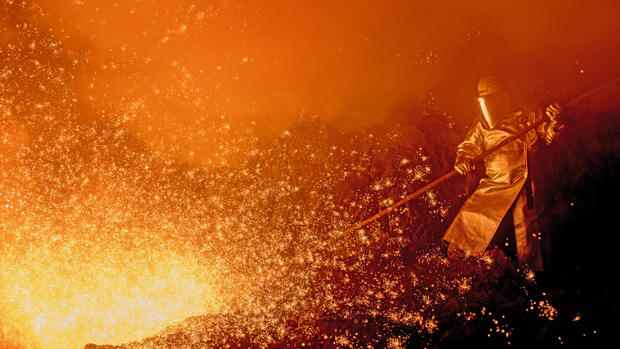The conventional blast furnace route no longer has a chance in the long run. When it comes to switching to climate-friendly processes, the industry needs help from politicians.
(Photo: dpa)
Federal Minister of Economics Robert Habeck (Greens) wants to support the transformation process of the steel industry. “We agree with the industry: we need more speed in investments,” Habeck told Handelsblatt. Climate protection agreements are “a key instrument” in this, he added.
Habeck met with representatives of the steel industry on Thursday to discuss the upcoming conversion. The industry is facing major challenges. In essence, it is about converting conventional steel production, which is based on the use of coal, to the so-called direct reduction process. This produces climate-neutral steel with the help of green hydrogen.
The German steel industry estimates the necessary investments at a total of 30 billion euros. Ten billion of these are due by 2030 alone. The companies cannot manage these investments on their own, as they also have to hold their own in international competition.
Many competitors outside of Europe are not pursuing comparable climate-friendly goals. They will therefore be able to offer their steel much more cheaply. The public authorities must therefore come to the aid of the European manufacturers.
Top jobs of the day
Find the best jobs now and
be notified by email.
Habeck referred to the signal function of the industry. The steel industry is the industrial sector with the largest share of greenhouse gas emissions. “If it is possible to set this up in a climate-neutral manner, then it will also show other sectors that the path can be successful,” said the minister.
It is about a “huge transformation task,” explained Habeck. This can only succeed together with the EU, industry and the federal states.
Double support planned
Companies are under time pressure. They must quickly set the course for the transformation and need clear commitments from politicians to do so. Investments have a long lasting effect in the industry because the systems are designed to operate for decades. Anyone who still invests in conventional technology today could soon be left behind.
Habeck had previously made it clear that on the one hand he wanted to help the industry with investments. On the other hand, they should also receive support with ongoing operating costs.
The topic also plays a role in the immediate climate protection program that Habeck presented in the second week of January. “We will create the legal and financial conditions for the provision of climate protection differential agreements as a central tool to support the transformation in the industry,” it says.
The German steel industry has to contend with strong competition from abroad.
(Photo: dpa)
According to Habeck, the immediate climate protection program should be “completed by the end of 2022, so that all measures can take effect from 2023”. A first part of the program should be ready by Easter.
>> Read here: Steel industry insists on quick commitments from politicians
The conversion to the new green production process in the steel industry can only work if large quantities of climate-neutral hydrogen are available as quickly as possible. In addition to domestic hydrogen production, a corresponding hydrogen import structure is therefore required.
In order to enable imports, the federal government launched the “H2 Global” project. Habeck is convinced that “H2 Global” can help “promote the international level and the international ramp-up of the hydrogen economy”.
The federal government has provided “H2 Global” with 900 million euros. The project is backed by a foundation that brings potential suppliers of green hydrogen together with potential buyers on the basis of tenders. Long-term supply contracts are to be concluded. Habeck has announced that he wants to expand the instrument.
The minister expects decisive impetus from the “Important Project of Common European Interest” (IPCEI) on the subject of hydrogen, which was already launched under the previous government. According to Habeck, eight billion euros will be made available for this.
Several dozen projects in which German companies are significantly involved are shortlisted for EU funding. In essence, it is about projects that are intended to initiate the development of a complete hydrogen value chain. The EU Commission will soon decide which projects will be awarded funding.
More: Climate neutrality is becoming a matter of survival for German industry
